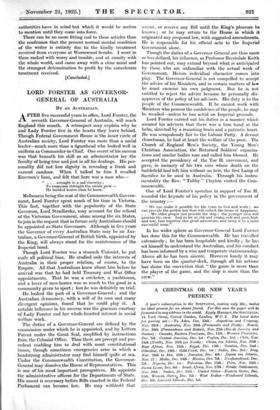LORD .FORSTER AS GOVERNOR- GENERAL OF AUSTRALIA BY AN AUSTRALIAN.
AFTER five successful years in office, Lord Forster, the seventh Governor-General of Australia, will reach England this month. A retrospect may explain why he and Lady Forster live in the hearts they leave behind. Though Federal Government House is the inner circle of Australian society, Lord Forster was more than a social leader—much more than a figurehead who looked well in uniform as Commander-in-Chief. One secret of his success was that beneath his skill as an administrator lay the faculty of being true and just in all his dealings. His per- sonality did not lose dignity in revealing a frank and earnest candour. When I talked to him I recalled Emerson's lines, and felt that here was a man who- " . . . wrought in a sad sincerity ; To conscious strength the vision grew— He better than he knew."
Melbourne being the seat of the Commonwealth Govern- ment, Lord Forster spent much of his time in Victoria. This fact, together with the popularity of the State Governor, Lord Stradbroke, may account for the refusal of the Victorian Government, alone among the six States, to join in the request that in future only Australians should be appointed as State Governors. Although in five years the Governor of every Australian State may be an Aus- tralian, a Governor-General of British birth, appointed by the King, will always stand for the maintenance of the Imperial bond.
Though Lord Forster was a staunch Unionist, he put aside all political bias. He studied only the interests of Australia in their proper relation, of course, to the Empire. All that Australians knew about him before he arrived was that he had held Treasury and War Office appointments. That he was a cricketer, a yachtsman, and a lover of race-horses was so much to the good in a community given to sport ; but he was definitely on trial.
He looked the part of a Governor-General ; and the Australian democracy, with a will of its own and many divergent opinions, found that he could play it. A notable influence in his success was the gracious courtesy of Lady Forster and her whole-hearted interest in social welfare work.
The duties of a Governor-General are defined by the commission under which he is appointed, and by Letters Patent under the Great Seal, amplified by instructions from the Colonial Office. Thus there are precept and pre- cedent enabling him to deal with most constitutional issues, though sometimes emergencies arise in which a headstrong administrator may find himself quite at sea.' Under the Commonwealth Constitution, the Governor- General may dissolve the House of Representatives. This is one of his most important prerogatives. He appoints the administrative officers for the Departments of State. His assent is necessary before Bills enacted in the Federal Parliament can become law. He may withhold that assent, or reserve any Bill until the King's pleasure be known ; or he may return to the House in which it originated any proposed law, with suggested amendments. He is responsible for his official acts to the Imperial Government alone.
Though the duties of a Governor-General are thus more or less defined, his influence, as Professor Berriedale Keith has pointed out, may extend beyond what is anticipated by those who are unfamiliar with the actual work of Government. Herein individual character comes into play. The Governor-General is not compelled to accept the advice of his Ministers, and in certain matters of law he must exercise his own judgment. But he is not entitled to reject the advice because he personally dis- approves of the policy of his advisers. His duty is to the people of the Commonwealth. If he cannot work with Ministers who possess the confidence of the people, he may be recalled—unless he has acted on Imperial grounds.
Lord Forster carried out his duties in a manner which assured his advisers that there was a fuze hand at the helm, directed by a reasoning brain and a patriotic heart. He was scrupulously fair to the Labour Party. A devout churchman, he had at heart the welfare of the poor. The Church of England Men's Society, the Young Men's Christian Association, the Returned Soldiers' organiza- tions and similar bodies rose and called him blessed. He accepted the presidency of the Toc H. movement, and gave, in memory of his two sons whose death on the battlefield had left him without an heir, the first Lamp of Sacrifice to be used in Australia. Through his instru- mentality the Rev. " Tubby " Clayton visited the Com- monwealth.
One of Lord Forster's speeches in support of Toc H. sounded the keynote of his policy in the government of the country :- " We can make it possible for the team to live and work ; we can provide the golden key that will unlock the house of happiness. . . . We older people can provide the ship ; the younger mon will provide th3 crew. And so let us, old and young, rich and poor, high and low, face together this great adventure. and bring it to a moist successful issue."
In his wider sphere as Governor-General Lord Forster has done this for the Commonwealth. He has travelled extensively ; he has been hospitable and kindly ; he has set himself to understand the Australian, and his conduct has been informed by a wise and temperate statesmanship. Above all he has been sincere. However lonely it may have been on the quarter-deck, through all his actions has shone the conviction that " the game is more than the player of the game, and the ship is more than the crew."














































 Previous page
Previous page